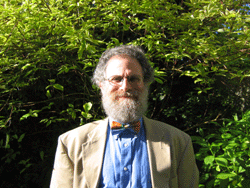|

People might be forgiven for thinking that computing is not so much a science as an industry. Ask someone to name a prominent computer scientist and you are more likely to hear the name Bill Gates than Alan Turing. In fact, computing is both a science and an industry, each stimulating the other.
Everyone knows that logic and computing have something to do with each other, but few understand the remarkable correspondence that links them. A model of logic and a model of computing, each published at the dawn of the computer era, turned out, half a century later, to coincide exactly. We will follow this correspondence through three strands of work, connecting three varieties of logic, three researchers at Edinburgh's Laboratory for the Foundations of Computer Science, and three applications to web technology.
Computing is in its infancy, laying the foundations for the work to come. Two hundred and fifty years ago, Edinburgh nurtured the work of David Hume, James Hutton, and Adam Smith. Two hundred and fifty years from now, to what extent will Edinburgh be recognized as founding the theory and practice of Informatics?
Biography
Philip Wadler likes to introduce theory into practice, and practice into theory. Two examples of theory into practice: GJ, the basis for Sun's new version of Java with generics, derives from quantifiers in second-order logic. His work on XQuery marks one of the first efforts to apply mathematics to formulate an industrial standard. An example of practice into theory: Featherweight Java specifies the core of Java in less than one page of rules. He is a principal designer of the Haskell programming language, and he co-authored Introduction to Functional Programming, which has been translated into Dutch, German, and Japanese. He appears in position 67 of Citeseer's list of most-cited authors in Computer Science.
Wadler is Professor of Theoretical Computer Science at the University of Edinburgh, and holds a Royal Society-Wolfson Research Merit Fellowship. Previously, he worked or studied at Avaya Labs, Bell Labs, Glasgow, Chalmers, Oxford, CMU, Xerox Parc, and Stanford, and lectured as a guest professor in Paris, Sydney, and Copenhagen. He served as Editor in Chief of the Journal of Functional Programming, published by Cambridge University Press, and sits on the Executive Committee of the ACM Special Interest Group on Programming Languages. He has been invited to speak in Aizu, Buenos Aires, Copenhagen, Denver, Edinburgh, Florham Park, Gdansk, London, Montreal, New Delhi, Oxford, Portland, Rome, Santa Fe, Sydney, Talinn, Ullapool, Victoria, Williamstown, Yorktown Heights, and Zurich.
|
Informatics Forum, 10 Crichton Street, Edinburgh, EH8 9AB, Scotland, UK
Tel: +44 131 651 5661, Fax: +44 131 651 1426, E-mail: school-office@inf.ed.ac.uk Please contact our webadmin with any comments or corrections. Logging and Cookies Unless explicitly stated otherwise, all material is copyright © The University of Edinburgh |